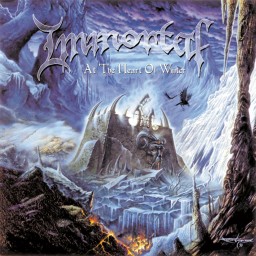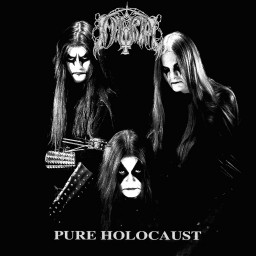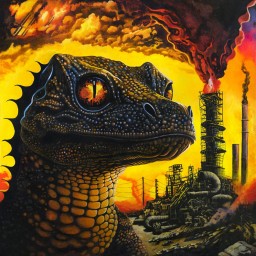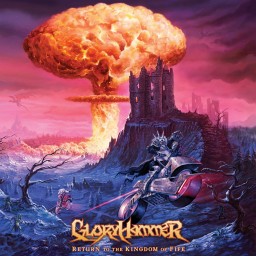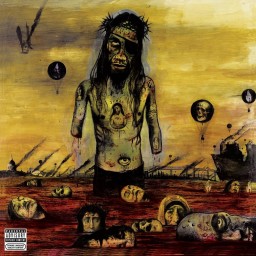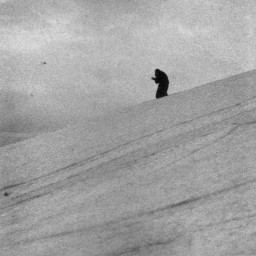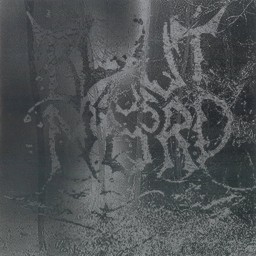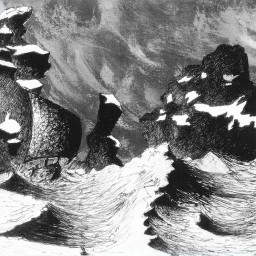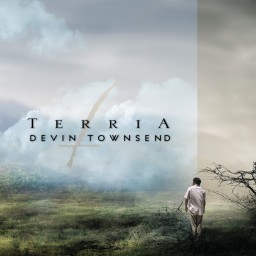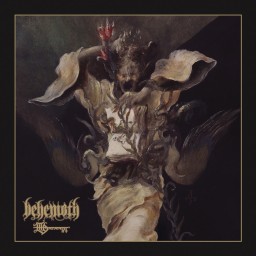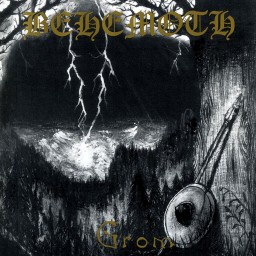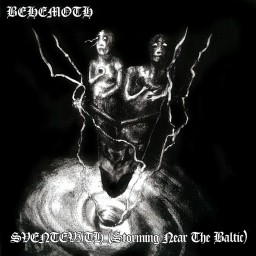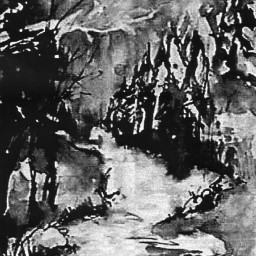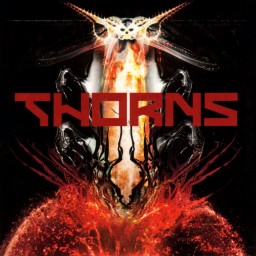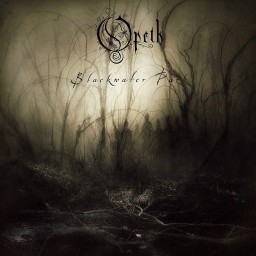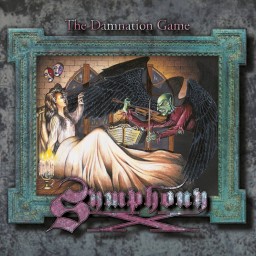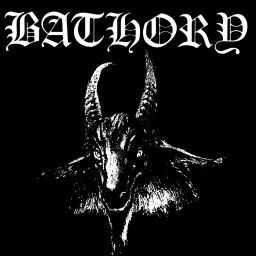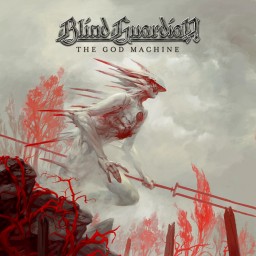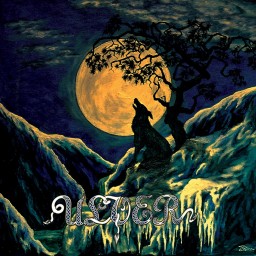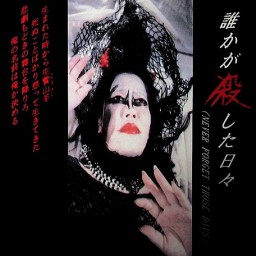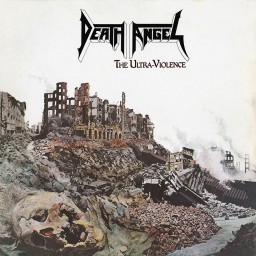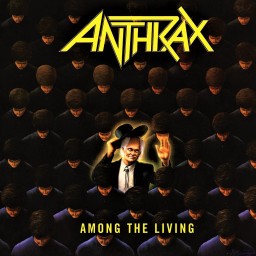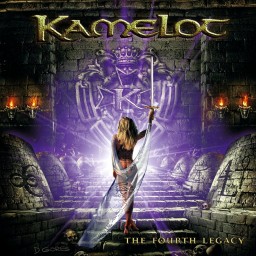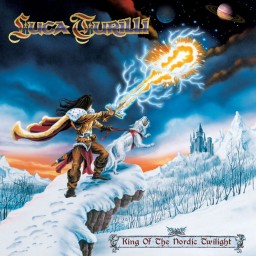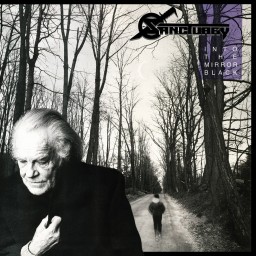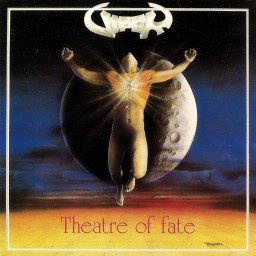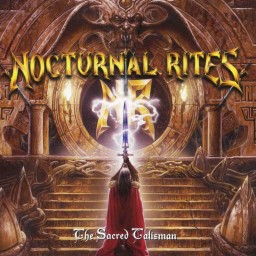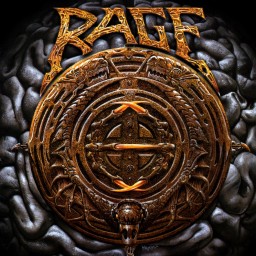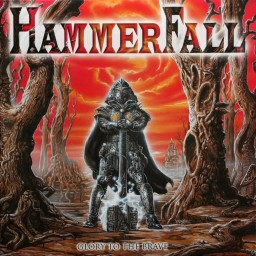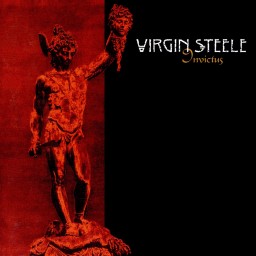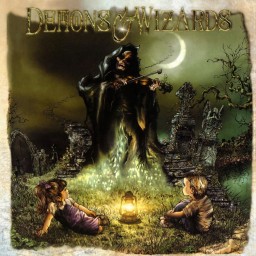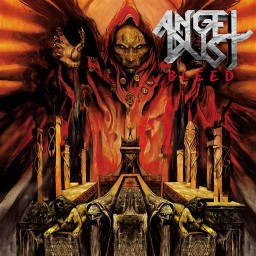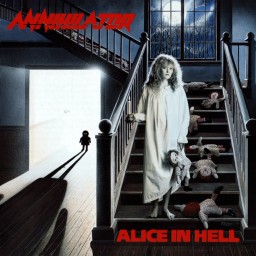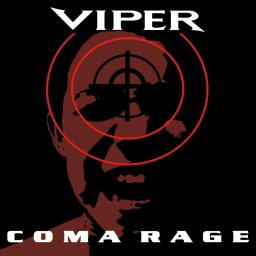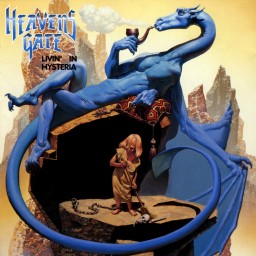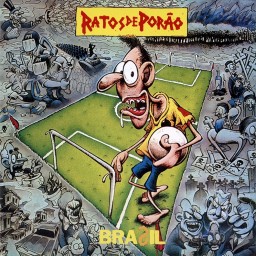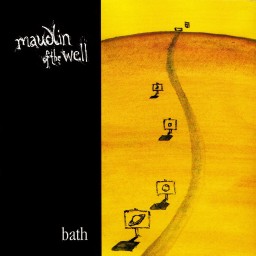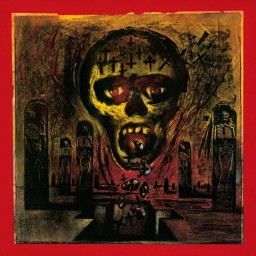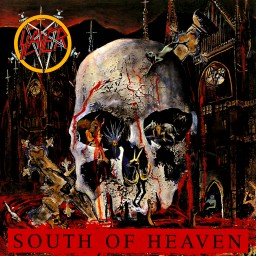Rexorcist's Reviews
Traditional black metal, founded by Mayhem, has been a staple of Norwegian music since its inception, and along with it will always be the bands associated with the early scene. Even though Mayhem fell out of favor once their frontman Euronymous was murdered by Burzum, and Emperor called it quits, Immortal has still been going strong, and their most classic album remains a contender by many to be the greatest black metal album in the world: At the Heart of Winter. This album did so much for the traditional black metal sound that it has many emulators, and is more accessible like Death's Symbolic, so it makes it good entry for new black metal explorers. It was mine.
At the Heart of Winter immediately lets you know that it's an "epic" album, telling a fantasy tale through rhyme and riff. So even though it behaves like a metal opera occasionally, it has none of the symphony of genres more associated with it, handling itself like a concept album about a place build for metal operas. The album has no trouble drawing the listener away into the world of Blashyrkh, using clear vocals to immediately suck you into the gothic poetry. The album's riffs keep coming and coming, and usually the album finds something new to give you but handles all the riffs in somewhat progressive manners.
Unfortunately, its run of tracks 2-4 are pretty much going for the same sound, and the longest of these three, track 3, is the least imaginitive. So its awesome sound draws out a little bit before it gives you a few new ideas in between its two final tracks, which help justify the album again.
This is Immortal at their best. They're a black metal band for hard rock fans, and their straightforward sound is almost mastered here. A the Heart of Winter is the first album I'd recommend any newcomer to black metal (unless they're experimental fans, in which case it would be something else).
Genres: Black Metal
Format: Album
Year: 1999
Immortal was my favorite black metal band for some time, seeing how riff heavy and atmospheric they can be. And their classic Pure Holocaust is a fine example of their more wintery sounds. They had some of that on their magnum opus, At the Heart of Winter, but this classic was a staple of the genre even before then. It remained their best album for a few years, but how does it hold up now? Well, this review's going to be short and simple like the album: there is constant speed, a pure vision of snowstorms plaguing every beautiful riff, and a presence that's difficult more many black metal bands to achieve. Unfortunately, I find that this album is more simplistic in comparison not only to At the Heart of Winter (and dare I say it Damned in Black), but has a one track mind that, while hypnotic and metallic, gets old. So while there are a lot of fun and great songs here, that's a major problem. Immortal built themselves on the black metal atmosphere during the early days of its album popularity, and they were probably experts at that alone, so this stands out as a traditional black metal essential. But compared to later efforts, it's become overshadows in creativity and will most easily satisfy those who are looking for more heaviness than boldness.
Genres: Black Metal
Format: Album
Year: 1993
King Gizzard and the Lizard Wizard - PetroDragonic Apocalypse; or, Dawn of Eternal Night: An Annihilation of Planet Earth and the Beginning of Merciless Damnation (2023)
Let's be honest: King Gizzard are a bunch of dorks, despite the quality of their music. For years their clever usage of garage-rock and punkish monotony took the musical underground by storm. two-hour long psychedelic albums would make this "projects" band comparable to The Grateful Dead, and they were one of those bands you only listened to if you were a "real" music buff. And then they became a thrash metal band. I was surprised with the good reception of Infest the Rats' nest, but I haven't gotten around to it just yet. I figured the thrash thing would just be a gimmick rather than a serious new side of them. And then PetroDragonic Apocalypse gets ALL the ladies I may be a Christian, but I love album covers with giant dragon motherfuckers telling the world it's his bitch. With reception on par with a classic-era thrash album or a Vektor album displayed on the internet, how could I refuse and stay true to myself? I'm a thrash and prog fanatic, and I can't get enough of it because there ISN'T enough of it, at least not enough that's good. So I put this on.
Son of a bitch. That Motorhead influence TACKLED me. The album is filled with repetitive but engaging progressive structures that leave the rest of the work to the charisma of the band harmonizing their vocals and jamming like hell. Even when playing a melody properly, these guys KNOW HOW TO JAM. And it isn't just because they've always been jammers due to their psych rock history, but they revive a side of metal that has been consistently overshadowed by the extremities of black and death as well as the surreal behavior of many modern acts like Oranssi Pazuzu, Krallice and Blut Aus Nord: the side of metal that jammed back in the days of 80's speed metal. This made the album stand out among the rest of the metal crowd. And because Gizzard also made sure to keep their fuzz factor in mind, this prog-thrash album also has stoner and sludgy undertones working with the Motorhead influence to further empower the jam factor. Thus, the personality is usually more engaging than the actual progressive structures, which themselves offer only a few surprises and may not be so enjoyable without the KG vibe. There are even some trippier moments scattered around that heavily recall the psychedelic side without falling into the genre. So the band is balancing out Motorhead, apocalyptic surreality, metallic jam factor and punk monotony all with their signature vibe fully intact. That's pretty ingenious, and almost fully justifies the occasionally lacking proggy structures. But get this: they saved the best for last. The nine-minute Flamethrower shows all the best of the previously mentioned aspects in the roughest display of heaviness on the album with abnormal consistency. It even includes the only actual psychedelic rock riff on the album, and it fits in no problem.
So maybe the individual tracks of PetroDragonic Apocalypse aren't the "best" thrash songs ever written, but they certainly are fun. Any aspects that shouldn't be very surprising are made much more surprising because King Gizzard implemented their psychedelic garage essence and personality into the thrash genre so well that this album, while being a completely different genre, still remains a King Gizzard album. The album didn't reach my lowest reasonable expectations. It was a little higher, but not the masterpiece the internet made it out to be IMO. But it seriously proves that Gizzard can pretty much do anything, assuming they aren't putting out six albums a year for the online rep. I feel that thrash fans should listen to this potential modern classic, but you'll get more out of it if you're already familiar with a few classic garage or psychedelic King Gizzard albums. This album represents one of the most effortless genre transitions I've ever seen out of hearing nearly 12,000 albums. But if you really wanna know what a prog Motorhead sounds like, then listen to this as soon as you can. King Gizzard have always been masters of monotony and personality through repetition, and their second thrash outing does their wacky catalog full justice.
92/100.
Genres: Progressive Metal
Format: Album
Year: 2023
OK, I'll give the album this: this is the best cover art for any of the four Gloryhammer albums. You got your mushroom cloud while a couple biker-knights (two words I never thought would logically be put together) are driving away on a possible homage to Judas Priest's Painkiller cover. And you still have room for the castle in a fantasy background with a Dark Crystal orchid sky.
But the album itself is a different story entirely. So we've got dorky-ass song titles like "Holy Flaming Hammer of Unholy Cosmic Frost," so they're not even hiding it. After the Engrish lyrics of the debut, they became kind of a comedy band, and it shows in the lyrics. But the album has stronger neoclassical influences which helps it stand out from the other three. But these influences arrive in place of the heavy punches and judo throws of the first album. Less punch, more glitter. Sure, the songs are still fun, but I would say that this album is a little lacking in comparison to the first three albums. The progressive/symphonic melodies don't feel so original anymore. So Gloryhammer's eagerly awaited fourth album is nothing short of a rehash of past ideas with a slightly different neoclassical style.
Genres: Power Metal
Format: Album
Year: 2023
OK, it's pretty obvious that, due to the return to roots, Slayer's Christ Illusion is often regarded as an improvement over the last couple albums, Undisputed Attitude, Diabolus in musica and God Hates Us All. There is truth to this. However, this doesn't mean Slayer's gone back to the same quality. No longer held back by the groove and nu metal influences that the late-90's and early 2000's were flaunting in the wind like a horse's dick on a nudist beach, Slayer decided to be the old Slayer again. However, this album only really impresses on the opener, "Flesh Storm," which boasts some pretty impressive riffage and feels extremely nostalgic for those familiar with the first five albums. But then we get immediately get to the part where Slayer is COPYING the first track over and over again until they finally do something different on the five-minute "Catatonic" which is already seven tracks in. In other words, not only does the entire first half copy the first track by making up for the variety with riffage, but the second half starts off that way before returning to that with the ninth track, "Cult."
So this return to form is palatable because it boasts some good thrashing. But on a critical perspective, I have to say that this is the first time one of Slayer's real "thrash" albums got tiring. In the end, each riff on the album, while pretty well done, is just another riff to get through before completing the album because Slayer already did better. Christ Illusion is a pure-blooded return to form in the sense that it offers nothing new. You might as well skip this one. In fact, I would even go against the norm by saying that Undisputed Attitude is better based on the merit of trying new things.
64/100.
Genres: Thrash Metal
Format: Album
Year: 2006
First things first: the bad audio quality hits you hard and heavy almost on instant. But somehow this demo managed to help influence future players in the black metal scene. This is because of its heavy snowstorm aesthetic, but for the most part, it doesn't remain that way on end until the end of each of these three sons. They're all 17.5 minutes plus, so thankfully our artist is smart enough to know that he should be mixing things up some. The noisy backgrounds only slightly drown out any screaming vocals or ambient noises that crawl out of the snow in desperate need of body warmth. Now I often joke that black metal can be used as a musical white noise machine, but in this album's case, it's totally true. This is one of the primary examples of letting atmosphere do the talking with slow-moving melodies that carry your soul rather than your body, and the backing effects and tunes help with that. And not every single minute is drenched in the noisy tremolos and noise backdrops, allowing for the backing sounds to take the foreground and the background whenever necessary. So this is an album all about the feeling and the soul of the atmosphere. While the only superstrong point in the entire album is how well the low production qualities were utilized, the everything else is pretty good, so Paysage d'Hiver proved that he was fully capable of doing more with less on the first go. This format would lead him to do many other albums under the same basic format, but this remains one of his absolute best.
77
Genres: Black Metal
Format: Album
Year: 1999
I demand quite a few things from any album I listen to: a strong and healthy sound, balance between variety and consistency, no monotony and perfect production for the type of sound. It also helps if the album itself is a unique take on its artform. One of the albums that best describes this balance is Blut Aus Nord's ever-creepy and super-twisty The Work Which Transforms God, which is coming to be one of my all-time favorite albums.
Blut Aus Nord were always trying to do something new and melodic ever since their debut, but they were stylistically just another atmo-group for the most part. The heavier industrial and experimental touches on this very diversified album set them apart s one of the best things black metal had to offer, maybe even the best. Even though black metal was originally the staple of Norway, black metal is such an easy sound to replicate that it's worldwide. But making an incredible black metal album loaded with influences and different types of songs going through a consistent and always disturbing 50 minutes is a difficult process. This album made it look easy by properly inserting disturbing sounds and perfectly fitting black metal vocals with excellent production.
In helping with rating this, I had finished At the Heart of Winter again and decided to play the latest Blut Aus Nord album at the time of this review: Disharmonium - Nahab. Well, I started it, but I wanted to compare it to this album, so I stopped it and finished this, and then finished Nahab. This album is a major step forward for black metal, and does its own thing without losing the band's spirit or the heart that made black metal what it is.
Genres: Black Metal
Format: Album
Year: 2003
After having gone through a ton of black metal albums to re-evaluate the way I see it, I've been doing a lot of rearranging, specifically for traditional black metal and a little of the atmospheric stuff, namely Blut Aus Nord. I found myself less satisfied with the Memoria Vetusta albums as they draw out despite their keen soundscapes. I need something that keeps me on my toes. When it comes to the more atmospheric stuff, that album is Ultima Thulee.
Ultima Thulee is aggressive and menacing, like the winter landscapes and blizzards themselves are out to kill you. But even as you can envision youself hiding in a cave or a cottage, you feel comfortable, as the album is very contemplative in its strong atmos. Whether it's shifting between soft and comfy or astral and cosmic dungeon synth, or shoving the blizzard down your throat and up your rear at the same time, the weather might always be snowing outside, but the weather's always changing. Honestly, this album does a much better job of drawing me into the winterworld than even Paysage d'Hiver ever did. Even though it's not the most diversified, it keeps throwing even old tricks at you in random but welcome places, and that's what makes it a good debut.
Genres: Black Metal
Format: Album
Year: 1995
Devin Townsend is one of the most active solo acts in the progressive metal scene, but he didn't start out a genius. No, his first album is a mistagged and overhyped (but unique and good-spirited) album called Biomech, released under the name Ocean Machine. It's considered by many to be a big step forward for modern metal, but IMO it was only an alt-metal stepping stone towards his future progressive sound. That sound would be improved and further explored over a few albums until we finally got to his fourth: Terria.
Terria is constantly surprising, applies the shoegaze production of Biomech to a number of soft and extreme rock and metal influences, and keeps the album consistent through the production values. Even on the third track, Earth Day, we get a full example of the best genre-traits of Townsend's diverse range at the time, so it's like Earth Day is a perfect representation of what the whole album has to offer. Unfortunately, the album has a bad habit of using too much noise, almost drowning everything out. So while this is a more advanced counterpart to Biomech for a greater sense of diversity and good balance, it's still shoving its biggest mistake down the lister's throat, so it's not quite perfect. But the album does a good job at drawing the listener into this shoegaze metal world and taking you on a world tour with some surprising compositions. Terria is IMO easily Townsend's greatest effort.
Genres: Progressive Metal
Format: Album
Year: 2001
I decided to rush ahead to Behemoth's chosen masterpiece (as decided on by the whole damn internet apparently) after having heard their first three albums. A little feeling in my gut told me that it would be a good idea to compare the albums after the first three to their best (if I agreed that it was good), so I jumped right into it. The moment I've been waiting for was rushed right into, and was it a good idea to get right to it? I think it was. Now I've got a real benchmark for the rest of the Behemoth catalogue.
Early on, the guitar work blew me away. It was a good idea to rush into this just to see how much they improved. The musicianship is very clever, and occasionally even phenomenal. Songs like “Amen” and “Blow Your Trumpets Gabriel” make the incredible level of epica feel like eight-minute epics rather than the standard length songs that they are. And each song has its own strengths. While “Furor Divinus” works beautifully on the melodic black death aspect with a brutal pace, the slower and more Gothic title track switches between the tribal influence and the genre art. Having said that, I would consider the title track the worst for being the most monotonous and least melodic. It even saves its darkest track for last, a seven-minute epic that gets really creepy and stays that way, throughout the slow-moving orchestral rhythms and the quick and quirky solo.
Now I did find one very important fault with the album, and it's the fairest one I can think of: In comparison to other eclectic and guitar-driven black metal albums, there are quite a few that I can think of that did it better. The first that comes to mind would be Blut Aus Nord's 777 – The Desanctification, which does everything this album does save the death metal, but with a more outgoing and experimental approach. And that's the worst of the 777 trilogy. Beyond that, The Satanist stays a pretty interesting album all the way through.
Well, I'm glad I've got a real benchmark for comparing future ventures into Behemoth. I would easily recommend this for the black metal fan, as it makes for a straightforward and talented entryway into both death and black metal. Having said that, I've already heard hundreds of other black and death metal albums, but I would still recommend this for those who want to try it... unless you're a strict Christian.
90/100
Genres: Death Metal
Format: Album
Year: 2014
I heard from Rateyourmusic that Behemoth's sophomore album, Sventevith (Storming Near the Baltic), is supposed to be the best of their worst era of musicianship: their first four albums. However, I felt that the sophomore was only a slight improvement over their debut, by a literal quarter star. Since their third album, Grom, was supposed to be worse, I expeted another disappointment. That isn't QUITE what I got, though.
After a monotonous dungeon synth intro comes the real speed and power of the album's genre. There's an improvement in the villainy of Nergal's vocals, as well as the quality of the guitar solos. “Spellcraft And Heathendom” even shows an improvement in percussion. The album is able to stand with the previous two entries and above due to the band's newfound brutality. And because the production values are a little better, the noisy quality works with the brutality instead of against it. Unfortunately, with this new brutality also comes new monotony. There's less of a will to experiment with new sounds related to the black metal scene than there was on the previous album, and so all of these songs are pretty much doing the same thing. It doesn't help that “Thou Shalt Forever Win” sounds almost exactly like “Rising Proudly Towards the Sky.” Thankfully, the closing title track is arguably the most epic song the band had done up to that point.
I guess I'm a little satisfied with where Grom went. Behemoth made some very drastic changes to their production approach, which helped a lot. Still, the flaws are still there and they haven't really learned how to perfect any of the elements that made this album their best so far. But I'd recommend this for anyone who wants something that sounds quite epic.
67/100
Genres: Black Metal
Format: Album
Year: 1996
Behemoth apparently grew a lot from their early days with their shit demo and their so-so debut album. I never expected anything less when I decided to check them out in chronological order (although I admit I heard the studio album before the earlier demo). So how does their sophomore attempt stand up?
Early on there are slight improvements in the band's songs. Among these faint improvements are a slightly more diverse attempt at songwriting structures and progressiveness. We even get some early hints of dungeon synth, such as the keyboards in the last part of the seven-minute epic, “Hidden in a Fog,” in the background of “Forgotten Cult of Aldaron” and the entirety of the following two-minute segue, “Ancient." Still, the album had some bad production values, and the whole album feels more like a garage demo than a sophomore studio release. Plus, whatever surprises there are in the album pretty much run dry before side B. And by the time of “Wolves Guard My Coffin” it basically acts like a punk album before other tropes take the end.
The improvement of the band's performances from their debut to this second album show promise. But you wouldn't know it just from these two albums alone, as there's still a lot of growing left to do. I wouldn't really “recommend” this album to anyone as there are so many better albums that do better things.
59/100
Genres: Black Metal
Format: Album
Year: 1995
Genres: Black Metal
Format: Album
Year: 2001
One more one-album wonder to want. Say that five times fast. Jokes aside, considering how few industrial black metal acts we get that can actually nail it, Thorns could never get their act together well enough for that supposed second album which was announced in 2008, and that includes constant band changes from what I've read. I've heard this album before, and I was pretty impressed. But with my standards having changed a lot since then, I worried I might not like it as much. It HAS been years since I touched it (that's what she said). Okay, not jokes aside.
As soon as the album starts, you understand the production. A crystalline dissonant sound throws itself at you like a bomb while the little intricacies in the percussions and the alien sound effects are heard faintly but perfectly clearly. This isn't the kind of production standard set by the average debut. This is what Taake needed for his debut, if you ask me. As well, when the industrial aspects take flight, they're just as in your face as the black metal. This is industrial metal that really does sound like it came out of a factory. These guys absolutely love their sound effects. With all the machines whirring in the background of the sparse and creepy Shifting Channels, I'm waiting for Ellen Ripley to say, "Get away from her, you BITCH!" These percussions are just amazing, but what else can you expect from Hellhammer of all people?
As for the creativity, higher than most black metal classics. There are many different applications for the industrial percussions and genre specifics, and not just for metal. It's very nice for Underneath the Universe to have a dark ambient middle section and end after some very tribal instrumentation. Even if it's not the most creative ambient track, it's nice to have one that doesn't last 25 minutes. And we get a very doomy strack, a bit like something from Godflesh but a little more mysterious at the end, so they know how to end an album with a bang.
A bunch of great songs, damn good production and some good creativity almost give this a five-star for me. Not quite, but it's there. And now to once again seethe in the sorrow of another great classic black metal band never getting past the first album.
93
Genres: Black Metal Industrial Metal
Format: Album
Year: 2001
I remember the first time I ever heard this album. I was jogging around the front yard on a fall afternoon, exposing myself for the first time to the incredible soundscapes of one of the world's most finely-tuned progressive metal albums. Even though I'm a generally jovial guy, I really appreciate deep and dark metal (when it's done right), and Blackwater Park hit the bill so beautifully well that when I turned on Still Life afterwards, it felt kinda weak in comparison. The album can be pretty dramatic, but not in an operatic or overdone sort of way. You get the feeling of being trapped in a lonely, broken down log cabin or a swamp in midnight, desperate not just for someone to save your life, but for someone to give you some positive attention. Akerfeldt's vocals barely even try to replicate this; it's all effortless resonance with soundscapes so authentically depressing that it almost matches My Dying Bride's The Dreadful Hours. Speaking of that album, if I had to fault the album for anything, it would be my common criticism that despite the brilliance displayed, the song-by-song structure gets a little monotonous as you know what to expect by the end, as most Opeth albums act. But this doesn't changer the fact that the album is brilliant throughout, and it ehelped me into the death metal scene without being a death metal album. Perfectly depressing.
Genres: Progressive Metal
Format: Album
Year: 2001
Symphony X are, in my opinion, quite possibly the second greatest metal band on Earth, placed right behind Metallica. They mastered the neoclassical sound multiple times and flow beautifully with the balance between prog, power and symphonic that comes with the genre. However, they certainly didn't start out that way. Their debut was an underproduced and generic piece of cheese with a few decent moments. They had a lot of practice to do. Thankfully, The Damnation Game gives us a good look at the fruits of their labor. While they were still young and clearly inexperienced, there were major improvements in the poetry of the lyrics, the production values, the layout of the songs and (most importantly for a neoclassical metal album), the classical solos. They sounded like the had a good idea of what they wanted to achieve, even if they were still closer towards the generic side. Maybe this is a more noticeable problem when you compare it to their next album, The Divine Wings of Tragedy. But doing so is a good move, so you can more clearly see how they were lacking in the mastery of epic production and delivery, as well as the complexity of the classical solos that made DWoT so brilliant. So while this is certainly not one of their best albums, historically, it's still relevant so the world can see what it took for them to become metal masters.
Genres: Neoclassical Metal Progressive Metal
Format: Album
Year: 1995
Taking the initial fuzzy speed metal sound of Venom to the next step, Bathory made a name for himself as an essential of traditional black metal, also since he was one of the more blatantly anti-religious acts of the time. It all started with a good practice run in developing the sound: his self-titled debut. Now when I first heard this some time ago, I gave this four stars. But now, I'm not so convinced. Now I'm not really that bothered by the dated 80's metal production that overtook so many extreme acts of the time. Thrash in general was loaded with it, and this is a blackened thrash album. And yes, there's definitely some good thrashing here. My major concern with the album is that these songs are short and yet extremely repetitive, becoming quite samey overtime. Thankfully, Bathory knew what he wanted to develop AT THE TIME, and made many improvements later. This is a catchy album with a good new vibe that worked out well, but in comparison to his later black works, this is pretty much just decent.
66/100.
Genres: Black Metal Thrash Metal
Format: Album
Year: 1984
I've been waiting for the chance to review this ever since I heard about it. In recent times, in fact just this year, Blind Guardian has become my favorite German band. For any internet nerd who knows me, it may come as no surprise that "Imaginations from the Other Side" is my favorite power metal song. I've been dying to hear how they reimagine the various pop culture influences they'd tackle, although I was pretty mad when I found out that, despite having the most Neon Genesis Evangelion album cover imaginable, they had no Evangelion songs, especially since the name of the album is literally The God Machine, which makes a lot of sense in EVA context. But the album was one of the most impressing returns to form I had ever heard, and it still had moments of improvement.
It fucking BLASTED me in the face. "Deliver Us From Evil" surprised me with the heaviest stuff I had ever heard from Blind Guardian, and in the end the melody was just as strong as it was on Somewhere Far Beyond and the speed metal albums preceding it. And the following speed tracks didn't get watered down in this regard. I mean, yeah I was a little worried when "Damnation" had pretty much the same tempo as the opener directly preceding it, but the song itself was still a very good, catchy and epic piece worthy of Blind Guardian's indisputable rep. But immediately afterwords, there's a slower symphonic epic piece that still spends a lot of time building atmosphere through the band's power and heaviness: "Secrets of the American Gods." If you know BG, you've already figured out that the lyrics reflect how much they read. Neil Gaiman is getting the same treatment as Brandon Sanderson and Tolkien. And this is probably the best song on the album so far (but it's a pretty close call out of these three songs). It does an incredible job at capturing drama without falling into symphonic power cheese. Of course, the jamming's back with "Violent Shadows," which lyrically handles The Stormlight Archives by the world-renowned king of magic systems, Brandon Sanderson. I know a bit about him from my brother who's a big fan. I can't say whether or not it's a good representation of that book since I've never read "Brando Sando," but I felt the fantasy energy. It helped that the song is so damn fast and heavy, but occasionally slows down for the mood's sake.
And then we get freaking space guitars and slow-ass tempos in a very weird and astral song that Wikipedia claims is about the big bang, "Life Beyond the Spheres." But looking through the lore of the lyrics and the fantasy vibe occasionally present, I feel like it's about something else. "Three kings foresee the healing reign" and "The great lord Osiris reigns forevermore" don't exactly say, "this is what atheists believe happened." I'm sure there's a deeper meaning in this. Not to mention, this is probably the least BG song on the album, despite the fact that the progression and vibe of the album is absolutely flawless, as well as the handling of melodies and riffs. Incredible work. Despite being about space, this song is so mysterious that it's cultish.
Now that I just wrote a whole paragraph for one song, lemme tell you about a much heavier song that starts out following that same cultish space vibe: a song about Battlestar Galactica. It feels like a war chant, but carries the sci-fi vibe well, and in ways Iron Savior could only wish to achieve and they've been trying since their inception. Next is a lyrical hybrid of the series The Leftovers and the death of Kursch's mother, "Let It Be No More." It's a wonderfully grim ballad that takes the heaviness of the album and applies it to the atmosphere and presence as opposed to the instrumentation. Two songs after the astral "Life Beyond the Spheres," this feels surprisingly in line with all of the riff-blasting speed tracks thanks to using the softer tracks to mold diversity and consistency. And the solo rings of some of the classic hard rock ballad riffs. You're gonna love this next one: "Blood of the Elves." If you guessed it right, yes, it's The Witcher, notably the first novel. The mood is incredibly badass, the riffs are super-catchy, and the delivery of the fantasy vibe is heavily reminiscent of Nightfall in Middle-Earth. It's the most BG song so far, in contrast to "Life Beyond the Spheres." And for a closer, I didn't expect the somewhat proggier intro and odd vibe of "Destiny," but its surreal approach drew me in once the actual metal kicked in. It has its own identity from all the other songs, and the riff is damn good. Lyrically, I suppose they had to throw in ONE old fairy tale. This one covers "The Ice Maiden," which I know nothing about so I'll just speak for the song: not the best song on the album, but a proper closer because it's different and it's got perfectly fine riffage.
There's a little bit of polarization coming from the BG fans already. I mean, this is their heaviest and most diverse album so far. But the thing is, it's a bit familiar. BG are essentially combining many things they've done well in the past: the speedy jams of the early days, the transition into symphonic fantasy concepts, and more. But I don't remember then ever handling the sci-fi vibe so damn well. Hell, on Somewhere Far Beyond which shows the band getting serious about fantasy orchestra influence, they started that album with a damn Blade Runner song. They never did space crap like this before, which means there's something very original about this song. Besides, I think the familiarity thing depends on who you ask, and personally, I'm up for it if they can justify it. And you knwo what the justification is? PEOPLE HAVE BEEN BEGGING THEM TO STOP BEING A CHEESY CLASSICAL BAND AND GO BACK TO SPEED METAL FOR AGES! If this is a mix of all previous sounds of this band and still includes some new outer-spece-themes sounds and compositions, then I think this is a perfectly fine album. Maybe none of these songs QUITE reach the level of the best songs from Imaginations or Nightfall, but I would go as far as to say that this is at least better than ANATO and Somewhere. This is the Blind Guardian people have been waiting for, and it's their heaviest and most diverse album so far.
Genres: Power Metal
Format: Album
Year: 2022
Everybody knows Ulver's debut album, Bergtatt, and how it's widely regarded as a key part of the development of black metal. Its gorgeous atmospheres, soft melodic vocals and beautiful defined a couple generations. It was actually the second black metal album I had ever heard, and is one I often recommend to newcomers in the black metal community.
Where the hell did it all go? Why did I give this album an 86 the first and only time I ever heard it? This time, Ulver deliberately chose to do lo-fi, which is perfectly fine, but they aren't as good at that as they were with the atmospheres. When you think of Ulver making another black metal album, you're hoping for something legendary. But at this point, I think I might've just been giving the album the benefit of a doubt because I wasn't very experienced in judging black metal back then. The mixing is pretty damn bad. It sounds like many other demos I've heard in this same subgenre. You'd think the artists here would find better recording material, like the stuff they used for their debut, maybe? The beauty is all gone because the music is now degraded to standard black metal. The melodies are okay and the riffs are pretty good, so it's got the key black metal energy we need at the very least. In other words, it's not a disaster because the music can at least hit those internal notes enough to be palatable. The only really good thing I can think of concerning the mixing is, yes, you technically do hear everything. But it feels imbalanced. The guitars are too loud, the lo-fi noise doesn't help anything, and the drums need the volume raised.
And the worst thing about the album is the kind of thing you'd likely expect me to say: there is absolutely no real originality here. It's pretty much the same okay stuff from front to back, and it eventually gets boring. Even after reading reviews, I'm seeing things like "It's intentionally worse in certain ways." Well if that's the case, then this certainly didn't surprise me like other intentionally lower quality projects did.
52
Genres: Black Metal
Format: Album
Year: 1997
It's no surprise that international countries wanted a piece of some serious metal action. Japan certainly loves their metal, and it's also no surprise that one of the more obscure ones would take the visual aspect into account by wearing corpse paint resembling kabuki make-up (or vise-versa?) But did this really help the music? NO! Why would it? Even after having heard their debut Gore, it's obvious that these guys are nothing more than just another thrash band.
I'm gonna keep this review simple for a good reason: Never Forget Those Days is a simple album. Even though it's a fast and furious album, there was very little brainpower put into the writing, so it just feels like another garage band from Bandcamp.com. Ironic; with titles like "The Warholic" and "Sayonara Suicide," you'd expect a very evil presence to plague this album the way it does the average Slayer release. But no, the whole album feels like underdeveloped basic thrash that's trying to follow in the footsteps of the preceding album. One of the pros of this underwritten album is that some songs like "Mere Anarchy" and the title track prove that these guys can play pretty damn fast without sacrificing too much rhythm. And it's a suitable album for fans of crossover thrash or powerviolence since the production is more punk-oriented and the singer is doing more shouting than actual singing.
Fortunately, there are some moments where the band tries to take guitar "effects" and atmosphere into account, notably during the lengthy ending of "Kuroi Dōwa" where the guitars are going for a mix of white noise and space travel, so even though it wasn't an amazing solo by any means, it was one of the better and more original parts of this monotonous album. And "Kindan Shojo" starts with some very dark moaning before going into a creepy and slow-moving metal piece with female orchestral vocals bringing out the mood. So that really helped make the album less tiring. But this doesn't always work. Their attempt at a classic blues song with "Iyada" sucks. It feels like a crappy bootleg demo from a different band. And by the time the album ends, we just get a cheap and fairly dark instrumentation with some obnoxious group screaming that sounds completely fake.
I wouldn't recommend this album for anyone. It's cheaply made and offers nothing new. To be fair I found myself getting more annoyed by the album than anything. These guys are pretty much only decent at the absolutel basics, and their efforts to expand their technique hurts as much as it helps. Comparing this to their OK debut, Gore, helped bring a more accurate outlook on this one. Gore isn't worth listening to, but it's still better than this.
Genres: Thrash Metal
Format: Album
Year: 1991
This is just coming off of their first two demos for educational purposes, and The Ultra-Violence has rerecordings of all three songs on the second demo, Kill As One. The biggest problem with that demo was the cheap production sometimes got in the way, but the production on their debut album, while not perfect, captures the energy they're performing with. It gets right into the thrash spirit really easily, and I mean REALLY easily. As far as the basic thrash standard goes, not only so they make it look like an advanced technique, but they make it look like they can easily do it whereas others can't. This is a level of power and aggression that even Coroner can't reach, despite the fact that most of these songs are written with the absolute basics and nothing more advanced than that. Hell, "Evil Priest" has some Kreator-level thrashing! But the album isn't just pure thrashing. As "Voracious Souls" proves, Death Angel likes to get unpredictable and think outside the box whenever necessary. And believe it or not, there is rarely any fluctuation between the quality of these songs. Not once do Death Angel lose their incredible force and spirit. Every track is a perfect exercise in thrashing force and speed, and not once does the band stray from this path unless their taking a more artistic and creative approach. Even as I was writing things for other websites, my focus on their energy and compositions never once strayed. This is an album I can find myself easily returning to just for fun, despite the fact that Death Angel are not phenomenal writers, just phenomenal performers.
Genres: Thrash Metal
Format: Album
Year: 1987
Let's be honest, Anthrax is the poster-band for the standard thrash sound, but that doesn't mean they can't make good music, just that they're most likely going to be limited in their prowess as long as they keep things that way. However, the title track tells you everything you need to know about this album: it's some pretty damn heavy thrashing, serious crossover attitude, and this rebellious nature drives the album for its majority. A big part of the album is that, lyrically, it tries to capture the essence of its time. Songs like "Caught in a Mosh": and "One World" make that obvious Still, does this album really stand out in anyway? It probably did at the time, considering that this was the most blatantly punkish of thrash metal's output that didn't completely steer into it. Combined with proto-groove metal elements, this was a farcry from most of the stuff you'd get in thrash, including the fact that these guys weren't afraid of mingling hardcore vocals and shouting with the heavy metal wail you'll find in Sanctuary and King Diamond works. The problem is that it hasn't really aged well. It's still a fun album, but can I honestly look at this and say that it's a true piece of musical art? Maybe only in the one vein. Otherwise, it's standard. Anthrax have an obvious tendency to write the same really good song over and over again. In other words, despite how much fun the album is, creativity is at a minimum. Among the Living is an album more suitable for playing a couple songs a time, picking favorites to put on a playlist because the energy and attitude are so good that the two get under your skin and into your soul. But as an album there are things missing.
Genres: Thrash Metal
Format: Album
Year: 1987
Kamelot is one of the world's best and most notable acts in the power metal scene. Their most famous albums, Epica and The Black Halo, are considered to be among the greatest albums in the world. But Kamelot needed some practice before they got as good as they became. After three albums nobody cared about, their fourth album marked a new age for the band, as they had proven that they had learned how to be true artists.
Kamelot is able to do several things at once on this album, making this one of their most artistic and outgoing. Taking occasionally worldy influences and mingling with the power metal isn't an easy thing to pull off. Most bands make it cheesy, but for Kamelot it's clearly natural. And there aren't many power metal songs as badass and dark as "Silent Goddess," which carries the dark and mythological vibe from the title track like it was nothing. Kamelot's strongest point is consistency without getting monotonous, and it shows on all of their best albums. This album seems to thrive on it. And the lyrics are not just mythical and empowering, but deep and sometimes romantic. The imagery here is remarkable. And when they're not riffing away in a monster of a power metal song, their riffs are very intriguing and catchy at the same time, with a great example being the opening riff of "The Inquisitor."
The ironic turn off for some Kamelot fans is that it's not as heavy as a power metal album should be, which is understandable, but it's still heavier than Holy Land and it does practically everything I expect from a perfect album correctly regardless of this oversight. Honestly, I'd say this is an underrated album which should be up with Kamelot's giants, as well as other power metal giants.
Genres: Power Metal
Format: Album
Year: 1999
Luca Turilli still had some very good ideas when he started his solo career, and King of the Nordic Twilight is one of his better ones just based on how different it can be from standard symphonic power metal, and the differences work all too well. The album doesn't give up on the energy, either. With the sonic speed neoclassicalism dominating the post-intro "Black Dragon," there are already clear differences between Luca's solo career and Rhapsody, and the music doesn't lose sight of the strong points of Rhapsody, either, notably the mythical flair and the triumphant energy. However, it's still not quite as metal-oriented as Rhapsody, so the speed and reliance, presence on classical instruments occasionally feel a little obnoxious when combined. When the synth effects came in, I started to wonder if this NEED to be a metal album. Don't get me wrong, the compositions are brilliant. The fantasy mood EASILY carries you away, probably more so than the first five Rhapsody albums ever did. Its usage of synths and progressive structures, as well as classical influences outside simple violin and organ all create something quite interesting and fun, and not so generic. It's just that for all its strengths, its greatest letdown is that it doesn't feel like a metal album through most of the songs, especially in the first half. However, there are plenty of Luca Turilli's stylistic traits at max power here, and I had a lot of fun with it. And I'll commit a taboo to power metal fans everywhere and say it's better than Symphony of the Enchanted Lands.
Genres: Power Metal Symphonic Metal
Format: Album
Year: 1999
Lemme start by saying that I planned to listen to all three Sanctuary albums. Refuge Denied was almost incredible. Even though it was clearly frontloaded, the stuff at the front was extremely metallic, effortlessly menacing and badass, and perfectly produced. If the debut was that good and it wasn't even the one everyone loves, this had to be better.
Immediately I noticed that the production wasn't as sleek and metallic, and their singer had to focus less on the screaming he was so good at. Unlike King Diamond, Warrel Dane never overused it, not even for the debut's album length. Now he's focusing more on singing, and as he focuses on the music itself, the band relies on attempting to create excellent riffs and melodies to drive the album rather than the cop-outs they still mastered on the debut, including heaviness and production. In other words, although both factors suffer only a slight bit, this sacrifice is perfectly necessary as it gives the band room to focus on playing as well as they can. Because oif this, the metallic mood molds with other more emotional moods.
I guess if there is a flaw with the album, it's pretty simple: despite how good each song is, the album has a bit of a one track mind, meaning that it had the potential to be an incredible release, but the band squandered it on variants of the same idea. But if you like that idea, each song is different enough to keep going without filler.
Genres: Power Metal
Format: Album
Year: 1990
I've heard a couple of Viper's worse albums before, and they always felt like just another metal band to me with nothing to set them apart, or to put them in the big leagues of Brazilian metal with Sepultura and Angra. But I never got around to their opus until now. Theatre of Fate is very short, meaning it doesn't have a lot of time to do what it needs to do, so let's hope the speed and creativity are jam-packed enough to work, if they exist, right? Viper's debut, Soldiers of Sunrise, felt more like a practice run for what power metal in Brazil would become, so I had mixed feeling as to whether or not the hype of this album would be lived up to.
The band's ability to jam is almost incredible. This early power metal release already matches Helloween and Blind Guardian in that vein, and their speed metal jam factor is at its peak as well as the album balances out the best of both worlds and makes it look like a five-year-old could do it, which we all know is not the case. The best section on the album may be the middle, as "A Cry for the Edge" and "Living for the Night" are all incredible metal pieces with some of the best riffing and metallic atmosphere I've heard from either genre. Let's not forget the occasional neoclassical elements such as the middle section of "At Least a Chance" and the opener to "Prelude to Oblivion." They aren't quite Symphony X level, but they are energetic and metallic enough to get the job done.
I'll be fully honest, I was NOT expecting Theatre of Fate to be this damn fantastic. I'm very critical of most power metal because I've thoroughly explored a great deal of it, and I'm careful not to overrate anything that doesn't deserve it. When I make a top 100 of something, I make sure everything in that top 100 is WORTH IT, and this was a very easy choice for my top 20 power metal albums. It's only 30 minutes, but those 30 minutes are used beautifully. I'd even go as far as to say that this is better than the first Keeper.
Genres: Power Metal Speed Metal
Format: Album
Year: 1989
I heard the first two Nocturnal Rites albums before heading to this, and I gotta say I'm not very impressed. Their early music is incredibly standard power metal. Thankfully, they show some improvement on their third album. The opener, "Destiny Calls," may be another standard, but the heaviness is improved upon, making its anthemic tone more fulfilling and easy to jam with. "The Iron Force" is slower in tone and a little less heavy, but more melodically focused, and the solo makes the best part of the song. It's probably the best solo the band had done at that point. The album goes right back to the speed on "Ride On," and keeps the speed up with their greatest focus on the medieval atmos with "Free at Last," which is the heaviest Nocturnal Rites song thus far (not counting the death metal demos). Not only are the vocals beautifully handled, but the incredible solo and atmosphere make this an incredible song. Nocturnal Rites, as far as I'm concerned, finally made a great, if not perfect song. Unfortunately, "Hold On to the Flame" felt typical as soon as it started. Sure, the energy is there, but that opening riff is still kinda generic. At least the heavy focus on melody gives its presence some oomph.
"Eternity Holds" is next, and it steers much closer to classic heavy metal, relying on the guitar tone. Unfortunately, the sense of rhythm suffers under the focus, so it feels like a filler song. "When Fire Comes to Ice" is different, though. It keeps the speed and energy of classic metal while focusign on both rhythm and badassery evenly, and it never once feels like filler. At this point it was the second best song on the album. "The Legend Lives On" is a ballad, one heavily driven by piano, and while it's a pretty enough song to go on a power metal album, it begs the question, why wasn't one of these on side A? It would feel less out of place if there was one on side A. "King's Command" goes right back to the anthemic power metal, and the vibe is quite empowering, but again it is a standard song. "Unholy Powers" continues that vibe with a similar tempo, but a higher focus on speed metal roots as far as the guitars are concerned. The song kinda jams. Finally, we have "Glorious" as the finale, and once again it just slightly improves on the tempo's speed and general heaviness, meaning the whole fourth quarter of the album is essentially three of the same song with slight differences. But since it's a bit faster and heavier, it makes for a good ending.
Honestly, Nocturnal Rites seem to have a problem with the concept of creativity. It's something that they seem to only slowly grasp with every album they release. Thankfully, they worked much harder on the standars of poiwer metal and trying a little harder to make a name for themselves. One of the songs, "Free At Last," was absolutely stunning, especially for their prowess. But other than that, it's a slight improvement on two decent albums.
Genres: Power Metal
Format: Album
Year: 1999
I imagine, since power metal is such a popular genre, that many non-power fans would be put off by the 70-minute runtime. I know I was. Then again, one of my desert island albums is 70-minutes long, but it was a very diversified album, so I couldn't be too quick to judge. I played this after not having heard it for at least a couple of years. Hell I haven't heard it since my second power metal album binge. I had hoped that the length wouldn't ruin anything, as the album seemed to have a lot of different genre tags attached.
Rage just blasts in your ear right when the album turns on. A very Kursch-esque singer, Peter Wagner, gets right on maximizing the capacity of his masculine voice without overdoing it. This title track here is a full-blown THRASH SONG, and it blatantly shows, probably even too blatantly. So I know heaviness isn't a problem, and if Rage knows what they're doing then they'll be able to keep up with the 65-minute album Black Hand Inn by Running Wild, which is very similar in genre, heaviness and tone. "The Crawling Chaos," however, seemed like it was just continuing where the title track left off but with a slower tempo, so I didn't fall in love with this song. Then "Alive But Dead" came on with its low acoustic intro and deep near-growls used in a rhythmic monotone. It doesn't take long for the song to turn into a darker thrash metal tune, but the process of evolution is carefully handled and perfectly timed. The song relies on mood and the mood is effortlessly brutal and full of the band's namesake. "Sent By the Devil" is kinda monotone, which is a little annoying, but it's great to have speed play a major role in the song after a cool, slower-moving one and have the consistency of the album stay perfectly fine. That's something Black Hand Inn didn't do. But as far as writing goes, this is total filler, proving that the album is too long.
"Shadow Out of Time" picks the album right back up with its sense of angel and its rhythm. Here the band focuses on trying to write something worth listening to. The solo guitarist, however, seems more focuses on wanking on his guitar rather than focusing on the quality of the solo, and only when another guitar overlaps with it does it focus on melody. "A Spider's Web" is only three minutes, and speed metal influence is obvious, with little hints of prog metal to give it a unique flair during the verses while the bridges and chorus are focuses on a punk-infused speed sound. Honestly, this was the most impressive song thus far, and has the best solo of the first few tracks. "In a Nameless Time" is a ten minute epic building itself on the monotony of atmosphere and effects, and once Wagner gets half-singing half-whispering, the slow thrashing begins before the thrashing bridge begins, and this cycle of verse and bridge continues into a melodic thrash-power chorus that progresses like a lyrical poem. Obviously, darkness and mood are the dominant factors here, as the verses feel pretty doomy. The midtro, however, is taken by acoustic guitar and violin for some sort of fancy "power epic" purpose, but it feels a little out of place, and that's the closest we get to a guitar solo in its ten-minute run. However, once the thrashing starts up again, the heaviest part of the song begins, and the thrashiness is at level 10.
"The Icecold Hand Of Destiny" is a straight-up heavy metal song by every definition. Decent rhythm, moderate tempo and lots of heaviness work for the song, but it doesn't stand out enough to be anything but filler, but the second half has a good guitar solo and the song gets a little proggy, so that's good. "Forever" is a more straight-up power metal song. Its opening riff feels exactly like something from an F-Zero game, notably GP Legend. However, once the riff ends, the deeper guitars and thrashing drums take over, so I had to wonder how these two genres would mingle. Once they did, the guitars playing the opening riff were too low-tuned and drowned out in the chorus to really matter, so the riff itself lost its effect, but the instrumentation and rhythms are still very good. :Until I Die" starts with an incredibly rhythmic speed metal riff, and gets right down to the signature tropes of the genre, including tempo, layout and jam factor. But considering how no other song on the album sounded like this, the surprise was pleasant. The heaviness never once suffered. It continues with "My Rage," which is more focused on being as heavy in guitar tone as possible, not relying on speed to express this, and as the shortest song on the album it doesn't get tiring.
"The Price of War" starts of with rhythmic thrashing which, I'd have to say, boasts some of the catchier thrashing on the album. And this song has one of the best solos on the album, which is a big sigh of relief because guitar solos obviously are not a strong point on this album. "Start" goes right back to the power metal sound that Rage is associated with, but it's a very standard song that I wouldn't repeat again. And finally, we get to the finale, "All This Time." Like many other power metal albums, this song acts like a ballad and even carries some symphonic influence in the mix. It's doing whatever it can to be an actual ending to a lengthy album, and from a melodic and moody perspective, it does just that. I wish, however, there were more songs like this on the album.
Honestly, I'm not sure why this is there most popular album. It seems like the filler often gets in the way of it progressing as a noteworthy power metal album. The heaviness is incredible, and that drives the whole album, and Wagner gives it his all in every song. Let's not forget how utterly diversified the album is. The issue here is that it's got such obvious flaws despite how enjoyable it is. The solos aren't great and the filler is obvious. Thankfully, there isn't A LOT of filler, and the pros are undeniable. If you've got 70 minutes to spare, this album's worth checking out once or twice.
Genres: Power Metal
Format: Album
Year: 1995
I had heard this once before, and at the time I had given this CLOSE to five stars. Now I'm not so sure, and I'm glad I have the motivation to get back to this and see for certain Right at the start, Hammerfall make a point of being loud, energetic and heavy... and I had to wonder if that was unintentional compensation for lack of trying to write great songs. "The Dragon Lies Bleeding" got every ingredient an essential power metal song needs, and nothing else, which means it's got every ingredient a GENERIC power metal song needs. The whole album has good melodies and solos, and the singer himself has a high enough voice to keep up with the excess energy of the band. Effectively, they've got the same riot factor that made the first few Ramones albums so good, so this album is a hard one not to jam out to. But it seems to me that throughout the entirety of the album, the band is RELYING on that jam factor. At least they have the decency to occasionally switch to a power ballad like "I Believe," which proves that the band has a strong idea of how to properly put power metal energy into a slow ballad. That's something a lot of power metal bands can't do at all. Unfortunately, the otherwise simplicity of the song recalls glam metal ballads, so that's a bit of a stinger in the album's overall quality.
The long and short of it that Hammerfall are not a brilliant band by any means. They are, however, good enough to attract the audience they deserve, and I'd recommend Glory to the Brave to any power metal fan to check out at least once. Chances are someone's gonna love it for its energy. These guys are very true to the power metal genre, even enough to occasionally make up for their average songwriting skills.
Genres: Heavy Metal Power Metal
Format: Album
Year: 1997
Right at the center of Virgin Steele's classic era, and right between two sets of albums separated into halves, Virgin Steele released their most famous album, Invictus, to the world. Seen as the third part of a trilogy with the two Marriage of Heaven and Hell albums, the album talks about the relationship between humanity and the spirit world, but is darker than the previous two albums, which is why it's a favorite for some.
Invictus is the kind of album where Virgin Steele makes a point of combining the feeling of mythological storytelling with the horror that metal is known for. The whole album is about carrying the feeling of tragedy that's so common in mythology and translating that, as well as a feeling of Hades, into metal through the epic/symphonic vibe you'd expect from movies based on mythology. There are Gothic tones scattered throughout the album, as well as faint hints of the romanticism (no pun intended) of the second Marriage album. "The Blood of Vengeance / Invictus" says it all, as it gets right down to the darkness instantaneously, and David DeFeis tries as hard as he can to sound demonic. However, he might be overdoing it, which kind of detracts from this horror story's status as a power metal song, which is made perfectly clear by the symphonic, prog and thrash elements. It's a very artistic song, but the vocals are the only problem.
But not every song is dark and eerie, such as the pairing of the segues "God of Our Sorrows" and "Vow of Honour," which go for a beautiful and maybe even romantic sound before getting right down to the epic power metal with "Defiance." Songs after the intro fluctuate between the fear factor, the mythology essence and the power metal factor, and most of these songs have moments of brilliance. Any external styles are used at minimum capactiy so as not to detract from the dark tone. The problem is that DeFeis should be doing actual singing much more often than the demonic growling he's trying to do. Still, the album has a lot to love, and it never goes straight to bombast, meaning it's a RESTRICTED form of power metal, and the restrictions work for the music rather than against it. The tone of this album makes it unique to power metal, and I share the common opinion that this is essential metal for how unique it is.
Genres: Heavy Metal Power Metal
Format: Album
Year: 1998
For those not in the know, Demons & Wizards is a power metal supergroup formed of Hansi Kursch from Blind Guardian, several members of Iced Earth and a member of Sodom. You'd think that a supergroup of that calibur would put out something flat-out amazing, and while they don't, they still put out something worth checking out, or maybe buying. Their self-titled debut is that.
Right from the getgo, the album displays the same kind of power metal energy and adventurous tone you'd expect from Blind Guardian, but with the darkness of Iced Earth. However, the first song's transition from a heavcy power metal song to a quiet requiem feels awkward as the song never goes back to the power metal, and thus is feels like two short songs. The transition between the heavy metal "Poor Man's Crusade" and the folksy "Fiddler on the Green" is so much more natural, and "Fiddler" improves on the outro of the first song with a proper sense of melody. The strongest aspect of the album is the medieval mood, played without ever having to be a neoclassical or symphonic band.
I couldn't help but feel like songs like "Winter of Souls" and "The Whistler" were a bit standard for the power metal scene, even though the performances were fine. The album doesn't really offer anything new, so Demons & Wizards just ends up feeling like a band influenced by Blind Guardian rather than a band as good as them. In the end, the album is perfectly enjoyable, but for a power metal supergroup, it offers the basics played well enough to satisfy power metal fans and nothing beyond that. The band shows most of their talents, but not all of it. I'd say stick with Blind Guardian unless you're specifically a Hansi Kursch fan.
Genres: Power Metal
Format: Album
Year: 1999
I went through the first three Angel Dust albums before heading onto Bleed. I wanted to see their evolution as a band to get a better idea of how this album relates to the other Angel Dust works. Their debut, Into the Dark Past, wasn't the most well-written album, but their ability to thrash was phenomenal. Next came To Dust You Will Decay, which was purely speed metal, and as a result, the thrash heaviness suffered. I found myself "missing" the thrash. Border of Reality was a quirky power metal album with a lot of twists and turns, and because it steered into power metal, the heaviness as back and the songwriting was improved due to the prog influences.
Bleed is considered their best album by many, likely because Angel Dust found a style to stick with and decided to make the most of it. I'll be honest, that title track has a perfect piano solo to open up any power metal album. I don't think Stratovarius ever achieved that kind of beauty, and molding that same solo perfectly with the heavy metal riff of the title track does an excellent job of carrying both vibes over. Truly epic. "Black Rain" has a heavier direction but with the same occasional symphonic hints, and the dark lyrical imagery brings out a level of mythology that's almost dream-inducing. We find the band going back to their thrash roots a little on "Never," keeping the mystifying vibe alive with with their classical effects and darker tone.
The next two songs are two parts entitled "Follow Me." The first part is easily a ballad, and a pretty good one, but nothing special. It didn't utilize Angel Dust's newfound sense of beauty to its fullest extent. The second part feels a little cultish in its careful usage of rhythm and symphonic effects, so keeping in line with the mood of the previous songs helped, even though I still wasn't amazed. At this point I was begging for something heavier to make up for the lapse in quality from the first three tracks, and I got just that with "Addicted to Serenity." It brought some of the old Angel Dust spirit back and brought out some good melodies along the way. As I expected, "Surrender" would be darker and more melodic, but I didn't expect something so lowbrow that it would be almost doomy before getting right into the heaviness with slow bursts of loudness. The seems to gradually get louder and heavier, building up to an epic and amazing ending, one that makes it obvious to me that this was the best song on the album.
"Sanity" is a constant switch between a power ballad and slow epic bombast which does what "Follow Me Pt. I" couldn't do, offer something a little different, and fans of heaviness should be satisfied that Angel Dust applied it to slower tempos, something they've struggled with in the past. The guitarists even recall the quirkiness of the previous album, Border of Reality. The album ends with "Liquid Angel," and as I half-expected, it starts off as a quiet piano piece. Maybe it sets the right mood for an ending to this album, but stylistically, the vocalist's sense of melody has to carry the song when the instruments won't. When the instruments take over, however, lots of creativity emerges, making this a proper ending to the album.
For the most part, I was satisfied. Angel Dust must've been experimenting with this album in certain ways, and the experimentation payed off to be their best album at the time. However, it IS a bit disappointing that the album isn't a little heavier. I won't deny Angel Dust's right to expanding their horizons, but heaviness isn't just another aspect of their music for them, it's a part of their identity. Still, I think it's a power metal album worth checking out, and I can't see too many fans being disappointed unless they need heaviness like a drug.
Genres: Heavy Metal Power Metal
Format: Album
Year: 1999
Alice in Hell was an album I had very little interest in beforehand because Annihilator never got the rep of my favorite thrash acts. Throughout last year, however, I checked out several of their albums. And I don't remember why, but at the time I first heard this, I loved it. Now that I came back to it, I can say that while it's a perfectly fine album, I don't love it the way I used to.
It all starts with the acoustic intro "Crystal Ann." The purpose of an intro is simply to set the mood for the rest of the album, so normally they're just sound effects or a small operatic piece, so they aren't that great. But "Crystal Ann" is a pure exercise in acoustic rhythm that simply melts the listener. Of course, this is pretty much forsaken and screwed in the ass as soon as "Alison Hell" begins, and we've got a demonic voice singing deathly poetics alongside strong thrashing, and the weirdness of their lyrical imagery is something the musicians try to reflect with their mood and tempo-changing. For a post-opener, this is really good, but ironically I like the intro a tiny bit more. Next, "W.T.Y.D." begins with more speed and a highly technical riff that sounds like it belongs on Rust in Peace. I gotta admit, I kinda want to cover this since it's so true to everything that thrash stands for, despite the fact that this emerged from a debut album. "Wicked Mystic" continues the tempo of the previous song, which is something I'm usually against because I want more out of an album than monotony. However, it was clearly a heavier song with a clear focus on aggression, and with that guy's fucked up voice, the song did feel just a little scary. A speed-style solo occurs in the middle, and it's easily the best part. That crazy dance-worthy composition is the kind of thing I would write. "Burn Like a Buzzsaw Blade" is next, and once again we have the exact same tempo. The key difference displayed at the beginning is the guitar riffs sounding a little more like a power metal song before going straight to the riffs. At this point, I had practically already decided that it would take a miracle for this song to surpass the previous. The whole song was pretty damn repetitive, with no real focus on rhythm at all. It was pretty heavy, but a kid could've written it. However, the solo sounded pretty psychotic and the wail at the end helped.
Sibe B starts with "Word Salad." First, lemme say that's the worst song title I've ever heard that didn't belong to crunkcore. I like the melodic and dark tone they go for, and despite ONCE AGAIN GOING FOR THE 130-140 BPM TEMPO, is a more complex and technical song than "Buzzsaw Blade." it was kind of a breath of fresh air. And when the mid-section took a slower pace for the sake of mood and calming the nerves, it was yet another breath of fresh air to the point where returning to the thrash with a kick-ass solo was easy to forgive, and after the third verse we get an even better solo, one that gets really weird and twisty, as if to say, "We already wrote an incredible song, so we can play whatever we want now." But still, what happened to the tempo changing of the post-intro? "Alison Hell" did it, so why don't the other songs? The next track, "Schizos," is definitely a little more speed oriented and perfectly composed, despite yet another venture into the 130-140 BPM sect to start. But after the intro, we get a much faster riff which doesn't have a lot rhythm, unfortunately. But just when I thought I was safe, they go back to the old one! This wasn't what I meant by changing tempos, Annihilator. At least they keep doing it throughout this near-instrumental with barely determinable vocals that may not have needed to be there. Still, the song does really jam, and it's obvious that the band is having a blast playing this song. It's one of those things you can just sense, especially with the wilder stuff like Frank Zappa albums. That same fun presence is there. Then "Legeia" came on, and I just gave up. Once again, the heaviness is perfectly fitting and the production brings the metallic sound out, and the riffs themselves are pretty clever. But otherwise, this just started out like another thrash song. "Human Insecticide" was the finale, and it was easily the most aggressive song on a very aggressive album, so it was perfectly suitable, despite needing a little bit of work in the rhythm department.
Alice in Hell is avery heavy and pretty well-written exercise in the essentials of thrash metal, right dow to the evil laugh at the end. And I'd say it catered to my minimum needs as a thrash fan. However, that tempo problem really needs to be fixed.
Genres: Thrash Metal
Format: Album
Year: 1989
To see a classic power metal act turn into a punk act must've pissed off a lot of fans, and Viper did just that. I expected to be sorely disappointed in this combo of hardcore punk and speed metal. But I wasn't. Honestly, as a punk fan, I have to admit that I found this worth checking out because it perfectly captured the essence of punk, and the speed metal brings that out even more. I've heard over 1,500 punk albums on top of 2,000 metal albums with some overlap between the two, and most of them suck. But this album kinda jams, and every song has paid-off effort put into them. In fact, their side-B cover of The Clash's "I Fought the Law" was pretty awesome, and they follow up with an incredibly heavy jammer called "God Machine immediately after," and this heavy metal piece is as nasty and headbang-inducing as metal should be. And this is all after an intro with a softer and more melodic side, so experiencing the heavy metal and punk just blast at full force was a very relaxing thing to hear. I'd recommend this if you're not a power metal purist.
Genres: Speed Metal
Format: Album
Year: 1995
Heaven's Gate aren't exactly a new thing. They take so much from earlier bands like Iron Maiden and Judas Priest that I can imagine more purist metalheads getting tired of them pretty quickly. Still, in the case of their sophomore album, Livin' in Hysteria, there's a lot of energy coming from them, probably more than Judas had done up to that point. That title track there is an excellent example of why heavy metal is so damn good: it's all about the badassery, which comes in many forms: independence, strength, anger at society, desire to rampage, etc. Of course, even the title track has a surprise hard rock midtro lightly reminiscent of the Southern rock of Allman Brothers while singing melodic vocals similar to early Kansas. Despite feeling out of place, the go right back on track with some great power metal solos. Another thing to point out is that they carry the fantasy edge of symphonic acts without being symphonic, and switch it with the speed metal sound of Running Wild when necessary. There's even a fairly neoclassical two-minute piece in the middle of the album, "Fredless," which, despite such a crappy title, does its just as an intermission piece very well and has some of the better riffs on the album. The riffs carry the very essence of metal badassery, and the vocalist does an excellent job amplifying that power. If the band didn't sound so much like Iron Maiden in spirit and tone, this would be a five-star release.
Genres: Heavy Metal Power Metal
Format: Album
Year: 1991
Crossover thrash bands seem to curse themselves with unoriginality and may make up for this with heaviness. Thankfully, a band like Ratos de Porao at least knows how to keep making good, if not great, melodies while successfully remaining heavy as hell. Ratos de Porao's Brasil is considered to be one of the best examples of crossover thrash, although it seems obvious to me that a large factor in this is its incredible, and I do mean INCREDIBLE, heaviness. If you ask me, it's just a couple feet away from the heaviness displayed in Kreator's Pleasure to Kill and Slayer's Reign in Blood. Ratos de Porao take the attitude and aggression associated with crossover thrash's drunken hooligan behavior, and maximize it, allowing for all 18 crossover thrash songs to rock out louder than they deserve to. It's full of powerful bursts of enough energy to power a city. Unfortunately, I still take everything else into account. This album does practically everything you can expect within the confines of a singular genre album, but when you have 18 songs, however short, it gets samey by the end. There's crativity here, but not enough to meet the standards of the thrash giants, so while it's a fantastic example of attitude and heaviness, it's just a little too long for my liking.
Genres: Thrash Metal
Format: Album
Year: 1989
So Maudlin of the Well have been on a fucking twelve-year hiatus, and don't even consider that MAYBE they're one of the most reputable names in the underground metal scene? I've mentioned before that I wish there was more metal that would make use of jazz, like Unquestionable Presence by Athiest did, and one of the first things that comes to mind in this vein would be the Maudlin's album Bath, which starts with a chamber and jazz combo that lasts seven minutes before we get to the actual metal, and it's a gorgeous intro that builds up the Hitchcockian pressure of waiting for the metal to strike hard through its cool acoustic jazzy mood. After the post-metal outro, we get a literal DEATH METAL song, and the group is quite adamant about emphasizing the genre this time. But the thing is the contrast is a little too strong.
While the songs on this album will usually be between great to brilliant, this consistency thing is a bit of an issue throughout most of the album. Although, there are some songs that bridge the softer side and the heavier side to help with the consistency, and thankfully the band plays with a lot of spirit and creativity. I mean, some of these songs have this outlandish ability to turn weird sound effects, like water in a drain, into a thing of beauty and serenity with the right acoustic sand production to play with these effects. And the fact that the band has such a strong sense of atmosphere means all of these songs have something very moody or serene about them. Still, the inconcistency thing is an issue, and if it weren't for that this would be a five-star album.
Genres: Avant-Garde Metal Progressive Metal
Format: Album
Year: 2001
Don't be too scared of the 65 minute runtime. It's worth it. The title track pretty much tells you everything the album's about. Extremely heavy work from the strings of Thilo Hermann and Rolf Kasparek work together to create a complete atmoshpere of brutality. Honestly, Running Wild are responsible for some of the most brutal power metal in the world. The whole album's sound encompasses everything about strength and power, regardless of the album's underdeveloped story. Almost every song has a guitar riff worth practicing for every metalhead, as the instrumentation and melodies carry the energy through the song until you just wanna burst out and sing their songs to the world, especially on the faster-paced songs like "The Phantom of Black Hand Hill." Very few songs capture the best of the Running Wild spirit like "Powder and Iron," which is probably one of my favorite Running Wild songs for its incredible riff. Some are more focused on the independence of your average pirate crew (or even biker gang) and have a darker tone. However, the album goes on with one essential trick up its sleeve, meaning diversity isn't exactly on their minds. Add that to the 65-minute length, it means the album becomes a bit predictable. The reason this is considered to be Running Wild's second best album behind Death or Glory is simple: no filler., despite the two-track mind. Still, there are hardly any albums that jam as hard as Black Hand Inn. You'll find a couple of favorite power metal songs on this if you love Running Wild, and I can imagine fans bickering over which songs are the best because the album's song quality is THAT consistent. Even its fifteen minute ending epic keeps itself going strong just through raw energy. Running Wild really did something special, and while it's worth noting that they're still essentially doing the same old thing, they still did that thing very well after eight albums.
Genres: Heavy Metal Power Metal
Format: Album
Year: 1994
I just replayed three Slayer albums over the last two days, since I had a mystious and sudden urge to listen to them. Believe it or not, there was a time that Seasons in the Abyss was my favorite, but has since stopped. I noticed something in comparison to Reign in Blood. While the melodic and songwriting construction are more diversified and improved, the album isn't as heavy as previous efforts. Thankfully, there's a keen level of songwriting sophistication (a phrasing I often use for five-stars) that largely makes up for this. In stark contrast to the more experimental vein of South of Heaven, Seasons in the Abyss fleshed all of that variety out into a more consistently jamming hole with occasional dramatic and slower bits to keep things a bit original. Once again, as is expected, Tom Araya's crossover-style vocals lead the thematic weight of this disturbing album while the guitarists both shred like hell, and we've got some of their most well-written and awe-inspiring solos, drawing you right into the disturbing scenarios of each song even while Araya isn't singing. There are very few albums as loud as this one, even though it's not as heavy as Slayer was before. But this is a finer technical achievement and an album that has a lot of replay value, which is common and expected for a masterful thrash group like Slayer. With a third five-star in a row, Slayer have cemented themselves as one of the greatest metal bands this planet has seen.
Genres: Thrash Metal
Format: Album
Year: 1990
Having just come off the backs of Seasons in the Abyss and Reign in Blood, I came to realize something: Seasons isn't just a less heavy album than Reign in Blood, but compared to Reign in Blood it feels so light! It's like sleeping in wool and then going back to a different blanket: you're just not as satisfied. Slayer themselves remained fast and heavy, but how could they lower the quality of their best skill over the course of two albums!? The best way to compare albums from the same genre is to first listen to several albums by one band at the same time and then compare those to each other first, and compare them to another band's catalog later. I remember having heard the first five Slayer albums in a single marathon, although I forget exactly which year I did that. But I had one strong opinion: Reign in Blood might've been the heaviest, but it was a bit monotonous. In fact, it reminded me of the Ramones debut for its length, sameyness and energy. This was better than the Ramones debut, but a contender for the greatest thrash metal album of all time? I look at things from VARIOUS angles, especially albums.
The way I see it, Reign in Blood and Seasons both make this mistake. And both are likely the most beloved of the five classic Slayer albums because they're arguably the fastest and most guitar-driven. But if Metallica ever proved anything, it's that you should NEVER be afraid of a change of pace, especially since there was no fucking way Slayer could recreate RiB, and the last thing they wanted was to go back to their speed metal days which had died out with the rest of whatever remnants of a scene there was. So what do we get? A slower tempo that's just as heavy as it needs to be. It might not be Reign in Blood heavy, but albums that focus on that before anything tend to ignore simple things like WRITING and CREATIVITY (looking at you, Pleasure to Kill). South of Heaven was all about changing that pace, and as a result it's not as fast throughout, and some would say that it's not as heavy. However, the album still has more power than Seasons.
I don't know about you, but if the band thought they could get away with the same song over and over again not just for one album but more, I would've lost respect for them. Instead, the took the approach I would've taken: take some time to fixate on melody. There's a reason Slayer's not selling the way Metallica is: Metallica knows melody like they were born and raised by it. And despite the slower tempo of the title track, there's a lot of punk attitude that we NEED in an early Slayer album, and fans of the old stuff still get what they want really early as the next track, "Silent Scream," is rooted deeply in that sound, but still there's a focus on rhythm. And the lyrics have to take over for the focus, and lemme tell you, this is fucking dark. Honestly, I don't know how they're comfortable singing this. At least they aren't Devourment. But they create the apocalyptic / ritualistic vibe perfectly with lyrics alone. Just from a critical viewpoint, this has to be one of their top five songs! And it's almost as heavy as anything from RiB. And speaking of the apocalyptic vibe, "Live Undead" handles that perfectly. The careful vibe may be slow for Slayer songs, and that's what makes it feel so apocalyptic. But the music is still brutal in every way imaginable, and it turns into a real thrash song with incredible speed in the second half, and the transition feels completely natural. "Behind the Crooked Cross" shows off the early groove sound that Slayer were going to take part in later on albums like God Hates Us All, but the thrash brutality is still perfectly healthy, hell even strong enough to tear a gorilla's arm off. "Mandatory Suicide" brings back that crossover attitude, but takes time to be catchy and jam for a while. The riffs at the end of the song sound like wailing monsters.
"Ghosts of War" goes right back to the classic thrashing, and it's probably the fastest song on the album. And it's so heavy that it sounds like it belongs on RiB, so as opposed to sounding like they're copying themselves, it's a piece of nostalgia. Even when the song slows down in the second half, it's still as brutal as ever. Afterwards is "Read Between the Lines" in which a careful balance between groove and thrash melodies aid Araya as he almost raps about his problems with preachy evangelists. I'm just gonna say it, I might be Christian, but I COMPLETELY understand why these guys are fed up with organized religion. And afterwards, we get another vicious and noisy work of thrash bombast: "Cleanse the Soul." It was at this point that I decided that "Ghosts of War" wasn't the heaviest song, it was "Cleanse the Soul," going at a whopping 200 bpm, and being the noisiest song so far. This was the true recreation of Reign in Blood without looking like they ran out of ideas. Next came "Dissident Aggressor," which more more about slow-building tension, but still took instrumental power and force into account. Despite the slow build, it's only two-and-a-half minutes, and it uses every second wisely with brute force still being present. Finally, we get "Spill the Blood," which isn't exactly the most proper song title to use in an episode of Sesame Street, right? This might be sluggish for them, but the way they handle the vicious atmosphere is flawless, and the focus on making an actual tune brings out a side of Slayer that hasn't quite been seen before, but feels in place for this album because there were hints of all of these albums strengths present in preceding songs on this album. But at the same time, I'm left wishing for more songs like this, and I didn't get a lot of songs like this all the way up to God Hates Us All.
Well, I'm fully convinced that from a creative standpopint, this is the best Slayer album. It's perfectly consistent while still being a thrash album first and foremost, boasting some strong groove and crossover elements, taking time to build a seriously apocalyptic mood through tempo and lyrics, and being filled to the brim with some of their best riffs. Reign in Blood is a little short and a bit too monotonous, and Seasons in the Abyss just isn't even heavy enough for me when compared to RiB, but South of Heaven carries songs perfectly fit for RiB and has a lot of its own identity at the same time. This is exactly what a thrash album needs to be, and I put this in the same league as Master of Puppets. ANd I feel like not only does this album fit my long-standing standards for perfection, but also taught me something about thrash.
Genres: Thrash Metal
Format: Album
Year: 1988










